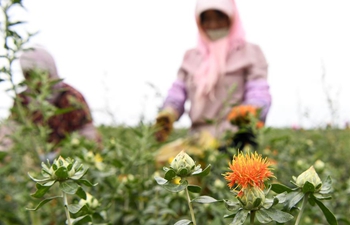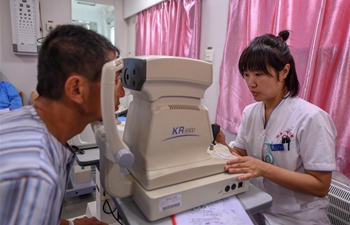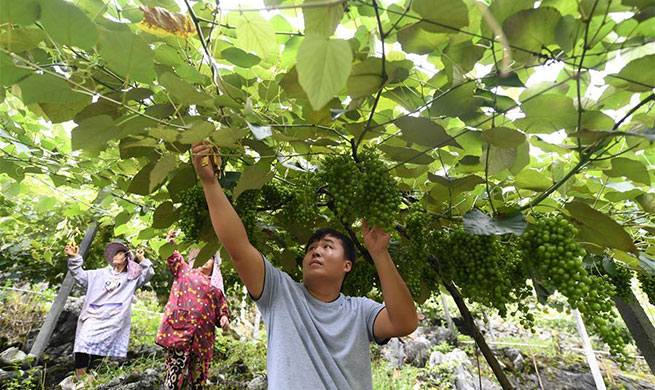SHENYANG, July 24 (Xinhua) -- Wedging her way off a crowded bus, Yan Ming, 60, strolls down the road towards a small workshop with the help of a crutch and warmly greets her workmates as she goes in.
She takes a seat, puts on her reading glasses and plays with her "dental drill" (an electric carving tool) and gravers in the light of a desk lamp, carving an ear of corn out of a single olive stone.
Yan has spent the past three years as an apprentice learning the intricate Chinese folk art of pit carving, superb craftsmanship that turns fruit pits into exquisite handicrafts.
The centuries-old traditional craft of pit carving first came into vogue during the Ming and Qing dynasties (1368-1911), in which fruit pits of olives, peaches, walnuts and other were used to create lifelike minute patterns of figures, landscapes, architecture and flowers and birds.
Yan puts her right little finger against her left thumb to avoid trembling, a hangover from almost six years on the wheelchair after a craniotomy she received following a severe car accident in 1999.
"When I was a green hand, it was hard for me to stop bleeding as the drill usually went in my badly shaking fingers," she said.
Ci Xiang ("kindness" in Chinese) would always come over and pat his discouraged prentice on the shoulder, sometimes a hug, to calm her down when she fidgeted and lost focus.
The 31-year-old master is the founder of the workshop which has taken in 16 members including Yan, all handicapped, to learn pit carving for free in its three years of history.
He shares the same misfortune with Yan, just in a different form -- being diagnosed with mental retardation since grade three in primary school.
When one door closed, another opened. Ci has a gift for pit carving. With the help of his father, he was lucky to learn the craft from Li Yongli, an accomplished maestro in Shenyang and inheritor of the intangible heritage.
"I could tell his condition from day one, but I like the boy very much," Li said. "He was much more focused and worked harder than normal kids."
With rapid progress made, Ci earned several awards with his works of art, which were sought after by enthusiastic collectors. The carved olive stone bracelet he made could sell for more than 20,000 yuan (about 2,908 U.S. dollars.)
Having found modest success in pit carving, Ci came up with the idea of running a workshop and giving free lessons on the craftsmanship to the disabled like him to help them come out of the haze of life.
With the support of the local disabled persons' federation, Ci founded his small studio in 2016. He said that his dream was to be a master of pit carving and impart the skill to more who could someday confidently stand on their own feet.
Last year, 367,000 physically challenged Chinese in urban and rural areas became new entrants to the labor force and 588,000 poor people with disabilities, who were both willing and capable for working, mastered at least one skill through practical training.
Yan was among Ci's first students. She preferred to call him the "young master."
She got 800 yuan for her first piece of work and bought her 90-year-old mom a cellular phone for the elderly, with a loud voice prompt of the number of the incoming caller.
More than 1 million people with disabilities in China have got rid of poverty in 2018. Mastering a labor skill not only helped them to improve financial conditions but more importantly, to reclaim confidence and hope.
Dong Xiaoguang, a retired jeweler who suffered from polio, rides for more than an hour every day on his electric wheelchair to Ci's workshop after finishing his 30-year-long career repairing watches.
"Carving is a kind of creation which needs communication with others, and I enjoy the learning and chatting," Dong said, noting that it was not about making a good fortune, but making a useful man and making a difference through personal commitments.
The young master and his 16 elderly apprentices have organized many carving charity bazaars in the past three years and donated more than 100,000 yuan for institutions like the disabled persons' federation.
"There may be some defects in my life, but there are no regrets," Ci said.















